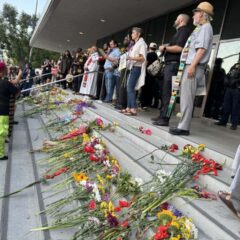CRCC Contributing Fellow Rhonda Roumani is one of six Muslim voices responding to Donald Trump’s proposed ban on Muslims coming into the United States in The Atlantic. Here is her contribution:
If Donald Trump’s ban had been in effect over the last several decades, America would have missed out on Steve Jobs, whose biological father, Abdulfattah Jandali, hailed from Syria. Also Farooq Kathwari, the CEO of Ethan Allen, Mohamad El-Erian, the former head of the investment company Pimco, and Tariq Farid, the founder of Edible Arrangements. Fazlur Khan, a Bangladeshi American architect and structural engineer who helped develop the technology for skyscrapers, would have never made it to the United States. The same goes for Ayub Khan Ommaya, a Pakistani American doctor who created the Ommaya reservoir, a catheter that drains fluid from the head and spine, and Ahmed Zewail, an Egyptian American Nobel Prize winner in chemistry who pioneered the field of “femtochemistry,” which enables the study of chemical reactions in real time. Sabri Ben-Achour of Marketplace recently estimated that banning Muslims could cost the U.S. economy roughly $24 billion.
My parents are immigrants too, from Syria. Like so many people who come to the United States, they love this country for the freedoms it has afforded them. Today, millions of Syrians are looking for new homes, not as immigrants but as refugees fleeing war. These refugees go through the most intensive vetting process of any group allowed into the United States. And opening the country to refugees, rather than closing the borders, could help counter the narrative propagated by extremists that the United States doesn’t care about the Muslim world. It is also these very refugees who will most value the freedom and opportunity to start over again.
Keeping America secure means working with Muslim communities to make them feel like they are part of the solution, not part of the problem. It means seeking a better understanding of why young people are attracted to Islamic extremism and better ways of protecting them from the violent Internet propaganda exported by groups like ISIS. Instead of bans, what’s needed are creative new policies that, for example, incentivize American Muslims to work with law enforcement. A father who wants to report his son’s suspicious activity shouldn’t have to worry that doing so could translate into a 20-year jail term and a criminal record for his child.
Closing borders will not solve the problems at the heart of the massacre in Orlando. The New America Foundation reports that U.S. citizens have been involved in 80 percent of the post-9/11 U.S. terrorism cases that the organization has examined. And Trump’s ban presumably would not prevent the entry of troubled youth from countries like Belgium, the United Kingdom, or France. The country needs broader, bolder solutions that target the disenfranchised and the alienated, and better gun laws that ban military-style assault weapons. And it needs a leader with a vision of America as a place that is open to anybody fleeing persecution, anybody seeking a new start, and anybody with a dream. That is what has long made America great.
Click here to read all six responses to Trump on The Altantic.
Rhonda Roumani is a contributing fellow with the USC Center for Religion and Civic Culture and a journalist fellow with the Spiritual Exemplars Project.





